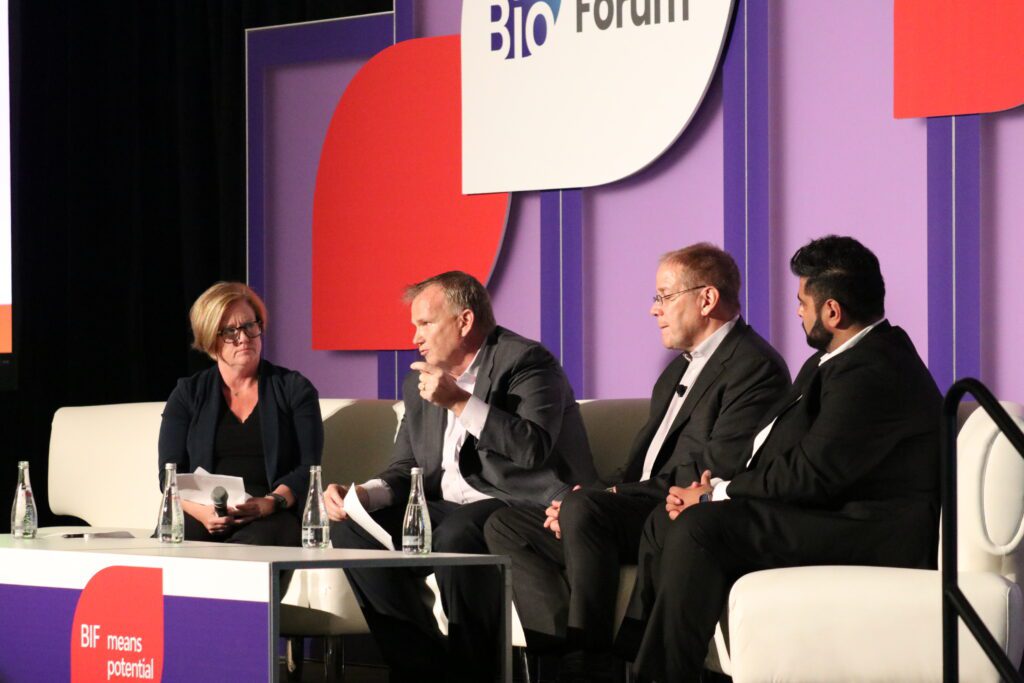The Inflation Reduction Act (IRA) has been top of mind for many in the biotech industry. The first round of price negotiations and the impending implementation of changes to Medicare Part D are giving investors, innovators, drug developers, and patients much to consider.
“On January 1, 2025, a newly redesigned Medicare Part D benefit takes effect,” said Crystal Kuntz, Senior Vice President of Health Policy & Research at the Biotechnology Innovation Organization (BIO), opening a session on the policy outlook at the 2024 BIO Investor Forum.
“As part of this redesign, patients have a $2,000 out-of-pocket cap. Also, with this redesign, government subsidies via reinsurance went way down, while plan liability increased significantly. And very importantly, biopharma companies are responsible for a portion of Part D costs: 10% before the out-of-pocket cap, and 20% after the out-of-pocket cap,” she continued.
“In addition, on January 1, 2026, negotiated prices in Medicare take effect for the first 10 drugs that were selected for negotiation,” Kuntz added. “Under the requirements of IRA, biologics can be subjected to negotiated prices 13 years after [Food and Drug Administration] licensure, whereas small molecule drugs are subject to negotiation much earlier, nine years after FDA approval. In addition, while there is an exemption from negotiation for orphan drugs, this exemption only applies to drugs that treat a single rare disease.”
Bio.News interviewed BIO’s Crystal Kuntz at the 2024 BIO Investor Forum in San Diego.
‘The IRA really disrupted how we think’
“I wouldn’t say you’re not seeing people abandon small molecules en masse, because if it’s a good small molecule, it’s still likely to get developed,” noted Jim Meyers, Senior Advisor at the Boston Consulting Group.
“But I am seeing companies going in the direction of biologics,” he continued. “You’re not going to hear announcements of that. It’s not necessarily the best headline to come out and say to a patient advocacy group, We’re not going down that route because of this policy.”
This move is not surprising given the IRA’s “pill penalty,” which has made small molecule drugs less appealing to investors due to their shortened ROI period of nine years (compared to 13 years for biologics). This has been especially evident in oncology, especially given the IRA’s problematic orphan drug provision, which excludes orphan drugs from price controls only if they have a single indication.
“The IRA really disrupted how we think, especially about cancer,” said Steven Potts, Ph.D., CEO of SLAM BioTherapeutics. “I was out fundraising for a small molecule, and I noticed a real difference in interest.”
“If you have 13 years to recoup your costs and that is reduced to nine years—those last four years is where you make all your money. So, you’re literally cutting the revenue of small molecules in half,” continued Potts. “Now I am hearing, If you’re going to do a small molecule, it better be freaking big. The bar is far higher.”
Raghav Aggarwal, Vice President for the BGR Group, said that when talking to policymakers, a bigger picture tends to be more compelling.
“When companies go individually and speak to policymakers about their specific pipeline, or how they’re seeing their investment being driven or not, it does somewhat fall on deaf ears,” he said. “Especially because it seems to be more of a company-specific issue, as opposed to an industry-wide, macroeconomic impact of the policy.”
“The missing piece in all the discussion, for the most part, is, What is the longer term actual impact on the ground? You could say all day that we’re not seeing as much investment potential in small, small molecules. But what does that actually mean? And then drawing the link between the fact that we have particular products today because of an investment that was made 20 years ago.”
How policy could fix the IRA’s unintended consequences
“When we talk about something like the EPIC Act, we’re talking about equalizing the negotiation timeline for small molecules and biologics,” said Aggarwal. The crux of the conversation then becomes not only the real-world implications but also conversations around cost for drug developers.
There has been consensus on the Hill that we need to repair the IRA’s orphan drug provision. But the industry needs to adjust its narrative when speaking to policymakers.
“We’re not asking for this gigantic exemption for all products that have a rare disease indication. We’re asking for an exemption for any product that only still has a rare disease indication but can have multiple rare disease indications,” explained Aggarwal. “It doesn’t truly make sense as to why we’re including a drug in negotiations that probably has two or three rare disease indications. A policy rationale just doesn’t exist.”
“Cancer is bipartisan,” added Dr. Potts. “If it wasn’t, we would all switch parties.”




